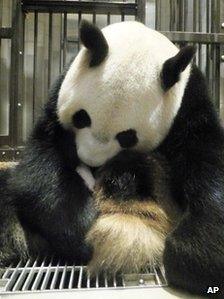Baby giant panda dies in Japan
- Published

Shin Shin with her baby just days after keepers realised she was pregnant
A baby giant panda born at a Tokyo zoo last week has died after inhaling its mother's milk, zookeepers have said.
The male cub, which had not been named, was just six days old and was found lying on its back on its mother's chest.
It was the first time the zoo's natural breeding programme had been successful, and the birth had been widely celebrated across Japan.
The cub's parents, Shin Shin and Ri Ri, arrived on loan from China last year.
Tokyo pays $1m (£640,000) a year to lease them.
Seven-year-old Shin Shin gave birth just days after being declared pregnant. The arrival was the first in the zoo for more than 20 years.
Pandas often experience difficulty in conceiving naturally, particularly when they are on public display, according to experts.
When the cub was found, it was not breathing. Keepers at Ueno zoo massaged its heart, but it was declared dead an hour later.
Wiping away tears at a news conference, the zoo's director Toshimitsu Doi said that an autopsy suggested that the cub had inhaled some milk when it was breast-feeding, triggering pneumonia.
The zoo's chief panda keeper, Yutaka Fukuda, said the cub had only just been returned to its mother after three days in an incubator.
"They peacefully spent the night and the baby was doing fine just this morning. It happened so suddenly, and it's such a pity," he said.
BBC's Mariko Oi says the panda's birth created enormous excitement in Japan
The zoo said it would set up a space for visitors to lay flowers and pray for the dead panda.
China often loans pandas to other countries as gestures of friendship and to take part in breeding programmes, but asks that all pandas and their offspring are eventually returned to China.
About 1,600 remain in the wild in China, with some 300 others in captivity - mostly in China.
Shin Shin and Ri Ri appeared for the first time in public shortly after a powerful earthquake and tsunami struck Japan on 11 March 2011.
- Published5 July 2012
- Published11 January 2011